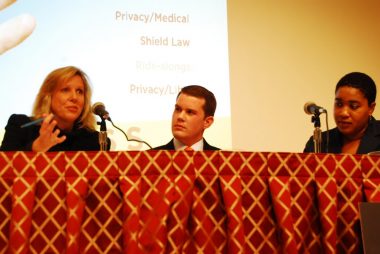How should journalists go about getting a story using public records? Is it ethical to cover the hospitalization of a public figure? And who should shield laws protect--are bloggers to be given the same rights as professional journalists?

Three panelists took on these questions and more in a March 16 Sunshine Day discussion about investigative journalism. Members of the panel included Matt Belanger, of WGAL-8 in Harrisburg, Penn., Sally Kestin, a reporter for the South Florida Sun Sentinel, and Jasmine McNealy, a professor at the Louisiana State University Manship School of Journalism.
The panel took on five major issues: journalists’ access to public records and information, the medical privacy of people in the public eye, shield laws and their interpretations, reporters riding along with police and privacy of public officials regarding libel.
On the public records issue, the three agreed that one of the best ways to go about getting information would be to ask to see a record as opposed to obtaining just a copy. But they said it is increasingly difficult to do that.
Kestin suggested the troubles may have to do with money issues.
“(Offices holding records) are very well aware of the dire financial straits of the media, and I think they’re capitalizing on that,” she said.
Belanger agreed, then took the idea a step further.
“It would be nearly impossible to prove this, but I think they just want us to go away,” he said.
As for the right to privacy for public figures, regarding both medical issues and libel, all three agreed the scenario is changing as blogs and citizen journalists gain popularity.
Belanger said when a Web site like TMZ gets a hold of a story like the Tiger Woods scandal or the death of Michael Jackson, the situation is problematic for a reporter because it is hard to confirm.
Because of libel concerns, Belanger said it’s hard for a journalist to approach a story that’s initially based on only rumors.
“You don’t want to be the guy that asks that question,” he said. “Then you’ll never get another question answered.”
All three felt riding along with police to get a story was blurring the distinction between the press and the police too much. To McNealy, it creates too many problems.
“I think when you get that concerted effort and basically the press becomes a member of the police force…then you start to have problems, because really the press is not supposed to be the police and the police is not supposed to be the press,” McNealy said.
A theme of ethical decision-making set the tone of the entire discussion, becoming the basis for the answer the panelists gave to their questions, and for Kestin, the changing world of journalism has changed the way ethics play a role.
“It changes by the minute,” Kestin said. “The competition is so intense to get any sort of breaking development.”
— by Jack Dodson, ’12


